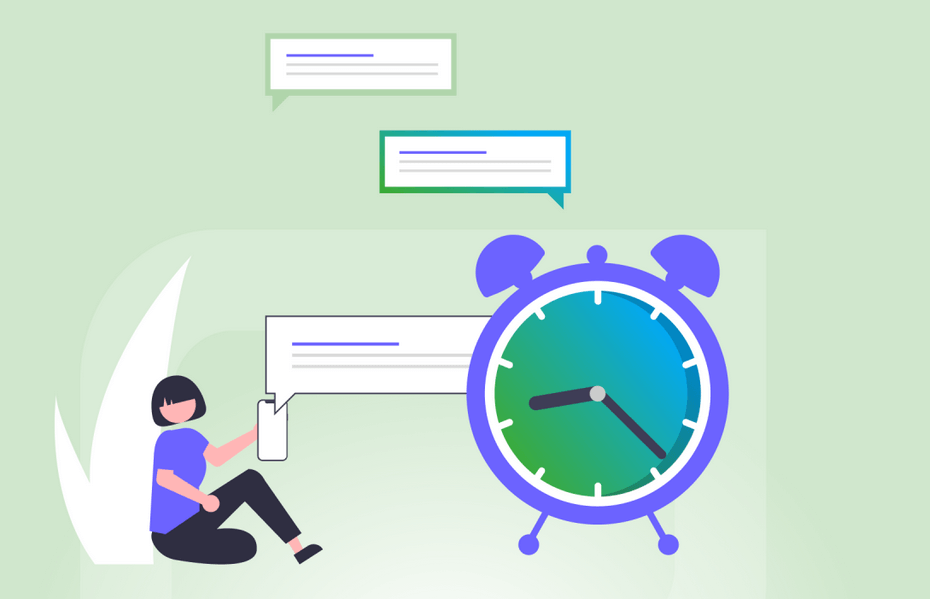📑 Table of Contents
SMS marketing has become essential for brands to connect directly with their audiences. With a 98% open rate, text messages often outperform email marketing. But just because they’re effective doesn’t mean timing doesn’t matter. One question usually arises: Is it ok to send an SMS after working hours?
Most people have busy, stressful days and want to relax by the end of work hours. An unexpected marketing message at 8 p.m. could feel intrusive rather than engaging. When your audience is winding down, bombarding them with promotional content might do more harm than good.
In this blog, we’ll explore whether sending promotional SMS after hours is a smart move or a recipe for alienating your audience. We’ll also discuss the impact of timing on your campaigns and how to ensure your messages reach people at the right moment.
1. Audience Behavior and Timing: The Key to SMS Success
The success of any marketing campaign depends on understanding your audience. People are not just customers; they have routines, preferences, and lives outside of work. Sending promotional SMS at the wrong time—especially after work hours—can lead to negative outcomes.
After a long workday, most people want to relax and disconnect. They may be having dinner, spending time with family, or unwinding. Getting a promotional message during this time can feel intrusive, and they may ignore it or even unsubscribe from future messages. The timing of your message is as crucial as its content.
In fact, a survey conducted by Tech Jury showed that consumers are more likely to engage with SMS during business hours, specifically between 9 a.m. and 5 p.m. Sending messages outside of this window can reduce the chance of engagement and increase the likelihood of irritation. When people receive a promotional text in their “off” hours, it can come across as inconsiderate and poorly timed.
Key takeaway: Understanding when your audience is most receptive is key to a successful SMS campaign. Sending messages during or just after work hours may not be the most effective approach.
2. The Impact of After-Hours SMS on Brand Perception
In marketing, first impressions matter. How your audience perceives your brand can make or break the success of your campaign. Sending SMS after work hours—when your audience is likely exhausted or looking to relax—can create a negative impression. Instead of seeing your brand as helpful or relevant, they might perceive it as intrusive and insensitive to their time.
Imagine receiving a promotional message for a sale at 9 p.m. while trying to disconnect from the day. Even if the offer is relevant, the timing could lead to frustration, causing people to unsubscribe from your future communications or block your number. Worse, they may develop negative feelings toward your brand, viewing it as disruptive rather than engaging.
A report by Textedly found that 44% of consumers prefer to receive SMS during the middle of the day, with very few people responding positively to after-hours promotional content. This shows that late-night messages aren’t just less effective and could damage your relationship with potential customers.
Additionally, many countries and regions have strict regulations regarding when businesses can send promotional messages. Violating these rules could harm your brand reputation and result in fines.
Key takeaway: Your brand’s reputation is on the line with every SMS you send. Poor timing—like sending after-hours—can do more harm than good, making your messages seem like an annoyance rather than an opportunity.
3. When After-Hours SMS Might Be Appropriate

A few exceptions exist, and sending promotional SMS after work hours is usually discouraged. In specific cases, after-hours texts might enhance engagement—provided they’re relevant, timely, and add value to the recipient.
Here are a few situations where sending after-hours SMS could be appropriate:
- Limited-Time Offers: If you’re running a flash sale or a time-sensitive promotion, it might make sense to send an SMS even after business hours. However, this should be done sparingly.
- Event Reminders: If you’re reminding your audience about an event happening the next morning, a well-timed after-hours message could help ensure they don’t miss it.
- Targeted Audience Segments: If you know that a particular group of your audience is active during specific times outside of work hours (such as young professionals or night-shift workers), it may make sense to schedule SMS for later in the evening.
However, even in these cases, the key is ensuring the message is relevant, and the timing makes sense. Consider your audience’s lifestyle before deciding the best SMS time.
Key takeaway: After-hours messages should be an exception, not the rule. If you must send an SMS during this time, ensure it’s highly relevant and time-sensitive.
4. Best Practices for SMS Timing and Audience Engagement
To maximize the effectiveness of your SMS marketing, timing is everything. Here are some best practices to follow when deciding when to send your promotional messages:
- Send During Business Hours: Research shows that SMS sent between 9 a.m. and 5 p.m. generally receive the best engagement. This is when people are most likely to check their phones for messages and are more open to marketing content.
- Avoid Early Mornings and Late Nights: Sending messages too early or too late is intrusive and can lead to higher unsubscribe rates. People are less likely to engage with marketing content when focused on their personal lives.
- Use Time-Zone Targeting: Consider time zones when running a campaign across multiple regions. After-hours in one area might still be work hours in another. Many SMS platforms allow you to schedule messages based on the recipient’s time zone.
- Segment Your Audience: Tailor your SMS campaigns to specific groups. If certain segments of your audience are more likely to engage during non-traditional hours, like late-night shoppers or shift workers, consider scheduling texts for those groups.
- Offer Opt-In for After-Hours Messages: Give your audience the option to receive messages outside of standard work hours. This way, you can engage with those who prefer after-hours content without bothering others.
- Track Engagement Metrics: Use analytics to track when your audience is most responsive. Adjust your timing accordingly if certain times yield higher open or click-through rates.
Key takeaway: Timing your SMS to align with your audience’s habits and preferences ensures your messages are welcomed rather than ignored.
Legal and Regulatory Considerations for SMS Marketing
1. Telephone Consumer Protection Act (TCPA) – U.S.
The TCPA is a key regulation governing SMS marketing in the U.S. It was established to protect consumers from unsolicited communications and applies to text messages as well as phone calls.
Key Provisions of TCPA:
- Consent Requirement: Businesses must obtain prior express consent before sending promotional SMS to consumers. Consent must be clear, specific, and given voluntarily.
- Time Restrictions: Under TCPA, companies are generally advised to send marketing communications between 8 AM and 9 PM in the recipient’s local time zone to avoid intrusion into personal time.
- Opt-out Mechanism: Every marketing message must include an easy way for recipients to opt-out, typically by replying with keywords like “STOP” or “UNSUBSCRIBE.”
Penalties for Violations:
- Fines: Violating the TCPA can result in substantial penalties. Fines can range from $500 to $1,500 per message sent without proper consent or outside of permissible hours.
- Class Action Lawsuits: Non-compliant mass messaging can lead to expensive class action lawsuits, significantly increasing the financial risk.
2. General Data Protection Regulation (GDPR) – Europe
The GDPR is a comprehensive data protection law in Europe that also impacts SMS marketing. Though it doesn’t exclusively target SMS, GDPR governs how personal data, such as phone numbers, is collected and used.
Key Provisions of GDPR:
- Explicit Consent: Marketers must obtain explicit consent from individuals before sending SMS. The request for consent should clearly state the purpose of the communication.
- Data Minimization: Only necessary personal data (such as a mobile number) should be collected, and it must be stored securely.
- Right to Withdraw Consent: Individuals have the right to withdraw their consent at any time, which means businesses must provide clear instructions for opting out of SMS campaigns.
Penalties for Violations:
- Fines: Non-compliance with GDPR can lead to severe financial penalties. The fines can be up to €20 million or 4% of a company’s annual global turnover, whichever is higher.
- Consumer Complaints: Consumers have the right to file complaints with data protection authorities, which could result in investigations and further reputational damage.
3. Other Regional Laws
Depending on the region, additional regulations may apply:
- Canada’s Anti-Spam Legislation (CASL): This legislation requires explicit consent before sending an SMS and includes provisions similar to those of TCPA and GDPR.
- Australia’s Spam Act 2003: Similar to CASL, it mandates clear consent and an opt-out mechanism.
4. Best Practices to Avoid Penalties
- Maintain Proper Documentation: Ensure records of customer consent are properly documented and stored.
- Respect Time Zones: Always be aware of the recipient’s time zone to avoid sending messages at inappropriate hours.
- Regular Audits: Perform regular audits of your SMS marketing campaigns to ensure full compliance with applicable regulations.
By adhering to these legal frameworks, businesses can avoid hefty fines and protect their reputation, ensuring they maintain a positive customer relationship.

Final Verdict!
Sending promotional SMS after work hours can be a double-edged sword. While reaching your audience when they’re off work is tempting, most people prefer to disconnect during these times. A poorly timed message can lead to frustration, reduced engagement, and damage your brand’s reputation.
However, if used carefully—such as for limited-time offers or urgent notifications—after-hours SMS can be effective. The key is understanding your audience’s preferences and scheduling messages when they are most likely to respond positively. Always prioritize relevance and value in your messaging to avoid being intrusive.
In the end, the success of an SMS campaign is not just about what you say but when you say it. By respecting your audience’s time and being mindful of when you send messages, you can build stronger, more positive connections with your customers.
